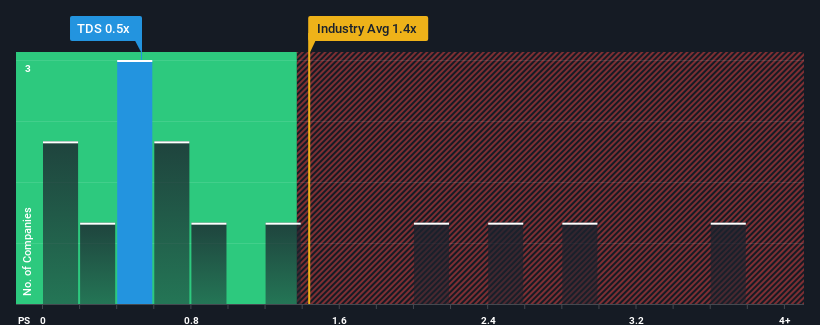- United States
- /
- Wireless Telecom
- /
- NYSE:TDS
What Telephone and Data Systems, Inc.'s (NYSE:TDS) P/S Is Not Telling You
With a median price-to-sales (or "P/S") ratio of close to 0.8x in the Wireless Telecom industry in the United States, you could be forgiven for feeling indifferent about Telephone and Data Systems, Inc.'s (NYSE:TDS) P/S ratio of 0.5x. While this might not raise any eyebrows, if the P/S ratio is not justified investors could be missing out on a potential opportunity or ignoring looming disappointment.
Check out our latest analysis for Telephone and Data Systems

How Has Telephone and Data Systems Performed Recently?
Telephone and Data Systems could be doing better as its revenue has been going backwards lately while most other companies have been seeing positive revenue growth. One possibility is that the P/S ratio is moderate because investors think this poor revenue performance will turn around. However, if this isn't the case, investors might get caught out paying too much for the stock.
Want the full picture on analyst estimates for the company? Then our free report on Telephone and Data Systems will help you uncover what's on the horizon.Is There Some Revenue Growth Forecasted For Telephone and Data Systems?
There's an inherent assumption that a company should be matching the industry for P/S ratios like Telephone and Data Systems' to be considered reasonable.
In reviewing the last year of financials, we were disheartened to see the company's revenues fell to the tune of 4.3%. The last three years don't look nice either as the company has shrunk revenue by 4.5% in aggregate. So unfortunately, we have to acknowledge that the company has not done a great job of growing revenue over that time.
Looking ahead now, revenue is anticipated to slump, contracting by 3.3% during the coming year according to the dual analysts following the company. Meanwhile, the broader industry is forecast to expand by 4.2%, which paints a poor picture.
With this in consideration, we think it doesn't make sense that Telephone and Data Systems' P/S is closely matching its industry peers. Apparently many investors in the company reject the analyst cohort's pessimism and aren't willing to let go of their stock right now. There's a good chance these shareholders are setting themselves up for future disappointment if the P/S falls to levels more in line with the negative growth outlook.
The Final Word
It's argued the price-to-sales ratio is an inferior measure of value within certain industries, but it can be a powerful business sentiment indicator.
It appears that Telephone and Data Systems currently trades on a higher than expected P/S for a company whose revenues are forecast to decline. When we see a gloomy outlook like this, our immediate thoughts are that the share price is at risk of declining, negatively impacting P/S. If the declining revenues were to materialize in the form of a declining share price, shareholders will be feeling the pinch.
We don't want to rain on the parade too much, but we did also find 1 warning sign for Telephone and Data Systems that you need to be mindful of.
It's important to make sure you look for a great company, not just the first idea you come across. So if growing profitability aligns with your idea of a great company, take a peek at this free list of interesting companies with strong recent earnings growth (and a low P/E).
Valuation is complex, but we're here to simplify it.
Discover if Telephone and Data Systems might be undervalued or overvalued with our detailed analysis, featuring fair value estimates, potential risks, dividends, insider trades, and its financial condition.
Access Free AnalysisHave feedback on this article? Concerned about the content? Get in touch with us directly. Alternatively, email editorial-team (at) simplywallst.com.
This article by Simply Wall St is general in nature. We provide commentary based on historical data and analyst forecasts only using an unbiased methodology and our articles are not intended to be financial advice. It does not constitute a recommendation to buy or sell any stock, and does not take account of your objectives, or your financial situation. We aim to bring you long-term focused analysis driven by fundamental data. Note that our analysis may not factor in the latest price-sensitive company announcements or qualitative material. Simply Wall St has no position in any stocks mentioned.
About NYSE:TDS
Telephone and Data Systems
A telecommunications company, provides communications services to consumer, business, and government in the United States.
Adequate balance sheet with moderate growth potential.
Similar Companies
Market Insights
Community Narratives


Recently Updated Narratives


MINISO's fair value is projected at 26.69 with an anticipated PE ratio shift of 20x


The Quiet Giant That Became AI’s Power Grid


Nova Ljubljanska Banka d.d will expect a 11.2% revenue boost driving future growth
Popular Narratives


The company that turned a verb into a global necessity and basically runs the modern internet, digital ads, smartphones, maps, and AI.


MicroVision will explode future revenue by 380.37% with a vision towards success



